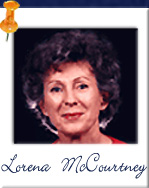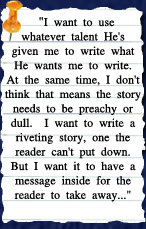


|
Focus on Fiction is pleased to feature Lorena McCourtney Lorena is an award-winning mystery author whose books are known for their complex plots and challenging topics. Her books include The Julesburg Mysteries series: Whirlpool, Riptide and Undertow, as well as Searching for Stardust, Forgotten, Canyon, Escape, Dear Silver, and a number of other novels. Two of her novels were finalists in the Inspirational Division of the Romance Writers of America awards, and Canyon was named "one of the Top 10 Christian Novels of the Year" by Booklist Magazine. Lorena lives with her husband Jim in southern Oregon.
|
|
Focus: Lorena, you've been a writer for many years, first for the secular field and more recently for the Christian market. Can you tell us how God brought you from writing mainstream stories to the place you are now in your career? Lorena McCourtney: My fiction writing began with juvenile short stories for the take-home Sunday school papers, and I had some 250 of these published. I then expanded into short stories for secular women's publications and eventually into mass-market romance books, all the time promising the Lord that I would eventually get back into Christian writing. After 24 romances, God basically grabbed me by the nape of the neck with the message the time is now. (It takes considerable effort for Him to get the attention of some of us!) He did this in several ways. A basic one was that everything simply went wrong. Stories that should have sold didn't. I had agent problems. I was uncomfortable with the increasing level of steaminess the secular romance publishers wanted. I floundered. I came the closest I've ever been to writer's block. It finally occurred to me that the Lord wanted me to use whatever small talent He'd given me for His purposes, and that is what I'm trying to do now. Focus: How many books have you released since you began writing for the Christian market? Lorena McCourtney: Nine books. Six romances for the Palisades line at Multnomah and three mystery/romances for Fleming H. Revell. Focus: All three books in your latest series, the Julesburg Mysteries, are available now in stores. Can you give our readers a brief synopsis of each? Lorena McCourtney: Certainly! In book #1, Whirlpool: The woman who stole Stefanie Canfield's husband is dead. Stefanie is accused of killing her. Did she do it? She isn't certain. Then, when the plywood mill she and her ex-husband still own together is destroyed by fire, Stephanie becomes a suspect. Fighting turbulent emotions as well as the arson and murder accusations against her, Stefanie wonders if faith is enough to get her through the confusion, the fear, and finally, a frightening confrontation with the killer. In book #2, Riptide: Newly reunited twins Sarah MacIntosh and Julie Armstrong plan to buy Julesburg's old theater, the Nevermore, and turn it into a mini-mall for artisans and crafts people. But bad things happen to people who become too closely involved with the Nevermore, as Sarah and Julie find out when a chance encounter with a robber at a convenience store sweeps them into a riptide of murder and danger. And in book #3, Undertow: Angie Harrison flees her glamorous life as New York model and buys Julesburg's weekly newspaper. In her quest for news stories about quiet Julesburg, she also becomes involved with the Nevermore. A man from her past in New York shows up, as well as another man from even farther back in her past. As Angie is dragged into an undertow of mystery and danger concerning murders both past and present, she must also face her own buried secrets. My readers can see Focus on Fiction's editorial review of this book at Amazon.com. Focus: With the Julesburg Mysteries, you switched from romantic fiction to suspense fiction. Of the two genres, which do you enjoy writing the most? Lorena McCourtney: I really like the mystery/suspense genre. I like the more complicated twists and turns of plot. When I read, I like books that keep me wondering, What IS going to happen next? How IS this going to end? So this is the type of story I enjoy writing as well. Focus: Rumor has it that you've just signed a contract with Revell for an exciting new series. Can you confirm this? Lorena McCourtney: Yes, I'm doing a Christian amateur-sleuth type mystery series called "The Ivy Malone Mystery" series. Ivy is a woman who is startled to realize that she seems to have aged into invisibility, but she decides invisibility has definite advantages and sets out to use them. Ivy has a tart attitude, a wry sense of humor, a definite "mutant curiosity gene," as a friend puts it, and a guiding faith in the Lord. The first Ivy Malone Mystery, Invisible, should be out sometime next summer and I think my readers will really enjoy getting to know this new character! Focus: You address strong issues in your books, everything from the new age religion to divorce and adultery. Do you ever find it challenging to convey in words the answers and hope needed for these difficult topics? Lorena McCourtney: Yes, I do find it challenging because my stories, like real life, are filled with tough questions. But the same God who writes our lives directs my stories, and I trust Him to bring the answers I need for both. Focus: Henry Ibsen once said, "Everything that I have written is closely related to something that I have lived through." Is this true for you? Lorena McCourtney: No, not entirely. I've definitely never been involved with murder! In fact, I can't say that I've lived through most of the really difficult situations I've written about. I do understand suffering and struggles, however, and I weave a little of that understanding into each of my characters. Focus: You've got a great story about your first professional writing sale. Would you mind sharing this with our readers? Lorena McCourtney: I was still a senior in high school when I wrote an article about my father's desire to move to Alaska. I didn't tell my parents when I sent it to a publication called "The Alaska Sportsman," so they were even more astonished than I was when the editor wrote back wanting to buy it. The publication sent a photographer to illustrate the article, paid me the magnificent sum of $15, and I became (very temporarily) a local celebrity. After the article was published I received a number of letters from a persistent young man who wanted to bring me a Husky dog from Alaska, although, with my parents saying "No, no, no!" I finally did convince him not to do this. The epilogue to this is that immediately after my college graduation my parents moved to Alaska, where they taught school for the next 16 years. Focus: We've heard tales of starving artists and writers selling their cars to fund their careers. Did writing have a negative impact on you financially, particularly at the beginning of your writing career? Lorena McCourtney: I certainly wasn't making much money when I wrote juvenile short stories for the Sunday School publications (which was one reason I expanded into the secular short stories for women), but it was a way I could be at home with my son and still make some money. There have been dry periods since then when sales and money were scarce, but now I'm blessed to write the books of my heart and not worry so much about money. Focus: You write stories that keep us guessing and page flipping late into the night. But you also have another hobby--one that has to do with sharp objects! Can you tell us a little about the collection you have in your living room? Lorena McCourtney: I collect old pocket knives and old spurs. The spurs are because I've had a lifelong interest in horses, but the pocket knives? I just don't know why I collect those. Maybe it's the mystery writer in me! Although I tend to go for knives with pretty handles rather than those with lethal blades. Focus: You've been called the "Master of Rabbit Trails" because your mysteries are woven with such complexity. Would you be willing to share with our readers about your story weaving process? Lorena McCourtney: For me, theme is the backbone of any plot. I know many writers don't work this way, that theme comes to them as they're writing the story. But I need this to hold my plot together. A backbone, in anatomy or story, shouldn't be highly visible; there's trouble if the bones are sticking out! But I need that backbone there, deep down inside, holding everything together. I need to know, basically, where the story is going before I start, a goal to aim for with the plot. But my actual procedure of getting the plot going is a little messy. Before I ever start writing a story, I collect a file of material loosely built around what the original idea was. This may include bits about a possible setting, scraps of dialogue or scenes, what I call simply "good lines" relevant to the story. When the time comes to write, I get out the file and start sorting my scraps of paper into various piles. This pile is about characters, that one about plot twists or scenes, other piles about setting and theme. I always like it when a title comes to me early on, as this seems to give me a more focused target. Then, I start sorting the pile concerning plot into a more-or-less chronological order. At that point I can begin to see the holes in the plot and then I can start filling them in. I do a very general outline of the story, nothing detailed, and so I fill in details as I go. And I always write chapters and scenes in sequential order. I know some authors write scenes ahead of time, and place them where they belong, but I can't do this. For me, each scene needs the foundation of the one that came before it. Readers who are interested in more information can read my article, Plotting: Trail or Trap on Christianbook.com. Focus: What do you feel is the greatest message with which God has entrusted you, and why have you chosen fiction as the medium for that message? Lorena McCourtney: I think the overriding message for most of my books comes from Hebrews 13:5: "Never will I leave you; never will I forsake you." The word trust isn't mentioned here, but that's what it's all about. Trust. Trusting in the Lord that He will never leave or forsake us- that He will always be with us. He may not remove our troubles and problems, but He will see us through them. As for fiction as a medium for that message, it's using the single small talent He gave me as best I can. I have no talent for music. Can't carry a tune, can't play an instrument. No talent for art. I still remember the disaster of a sunset I painted in 6th grade art class. It stood out from others the teacher tacked to the wall like some combination of an acid spill and a volcanic eruption. I have no athletic ability, nor do I have the patience or coordination for creative crafts. So for me, writing is it! Focus: In what ways are you and your female heroines alike? Lorena McCourtney: I think there's a little bit of me in most of my heroines, although they've tended to be more adventurous, more outgoing . . . and definitely taller! But they all have some of my insecurities and vulnerabilities. There's probably more of me in Ivy Malone, the amateur sleuth of my new mystery series, than in any of my earlier characters. Which may be why I'm having so much fun writing her. (Although Ivy, too, is more adventurous than I am.) Focus: Where do you get your inspiration for your stories? Lorena McCourtney: Good question, which I suppose is a form of that question most asked of writers, "Where do you get your ideas?" I can only say that ideas and inspiration come from nowhere in particular . . . but everywhere. I don't get an idea or inspiration for a story, and immediately sit down and start writing it. I file it away and let it simmer and grow (or die!). Also, ideas or inspiration seldom arrive full-blown. It takes a lot of hard work to turn an idea into a full book with a theme, characters, beginning, middle and end. I tend to think of the construction of a book as a circle encompassing character, plot, theme, setting and title. An idea may enter at any point in that circle, but a writer still has to flesh out everything else in the circle. Focus: Can you describe your average writing day? Do you have a set schedule, or just work like crazy when the muses strike? Lorena McCourtney: I consider writing my job, and if I waited for a "muse", I doubt I'd ever get anything done! My average writing day usually starts with a reading from a daily devotional, Bible reading, and prayer. I have to check my e-mail, of course. And then I start the actual writing day by going back over the previous day's work. Or sometimes I go back a lot farther than that. I don't use the process of doing a complete, rough first draft and then subsequent drafts. I keep tinkering with what I've written so that when I get to the end, it really is, except for a final polishing, the end. Only after I go over the previous work do I go ahead with the new writing. Focus: If you were to summarize your vision and purpose for writing, what would it be? Lorena McCourtney: Basically, since I switched to Christian fiction, what I want to do is serve the Lord with my writing. I want to use whatever talent He's given me to write what He wants me to write. At the same time, I don't think that means the story needs to be preachy or dull. I want to write a riveting story--one the reader can't put down. But I want it to have a message inside for the reader to take away, so that when the book is finished, something stays with him or her even if it's just on a sub-conscious level. Focus: How can your readers and fans be an encouragement to you? Lorena McCourtney: I always love to get letters from readers. And if you like one of my books, tell someone else about it. And especially tell the bookstore where you bought it. Tell the owner in person if you got the book from a local bookstore; or write up a review on Amazon, Christianbook or Barnes and Noble online.
|











© Focus on Fiction, 2003-2005 All Rights Reserved. Site maintained by PulsePoint Design. Direct questions or comments here
| Home | Upcoming Author Interviews | Past Author Interviews | Christian Fiction Reviews | About Us | | FAQ’s | Contact Us | Links |